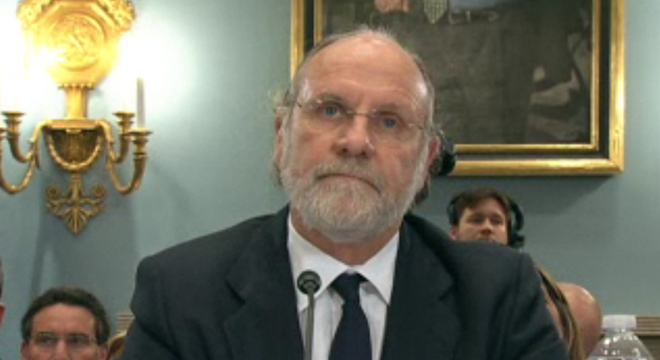Jon Corzine denied any knowledge of what happened to the estimated $1.2 billion in customer funds that went missing in the days before MF Global went bankrupt, telling a congressional panel on Thursday he “was stunned” when he heard about the funds, but “I simply do not know where the money is.”
Corzine was subpoenaed by the House Agriculture Committee, and testified about the discovery that money in MF Global’s segregated accounts had gone missing before the firm went bankrupt this year. Corzine, the former governor of New Jersey, resigned in the wake of the firm’s bankruptcy.
There are currently criminal and civil investigations into the company by the FBI and the U.S. Commodity Futures Trading Commission. And though neither Corzine nor other MF Global executives have yet been charged with a crime, there is speculation that laws requiring futures firms to segregate client money from money used to bankroll the company may have been violated.
MF Global declared bankruptcy on October 31, shortly after news broke that it had repurchased $6.4 billion in European sovereign debt issued by troubled countries such as Ireland, Italy and Spain. After the news broke, MF Global’s debt was downgraded to junk status by credit ratings agencies. The missing funds were discovered during an attempt to sell the firm. The trustee overseeing the bankruptcy has estimated the shortfall to be $1.2 billion.
Corzine, who was brought in to serve as MF Global’s chairman and CEO in March 2010, denied any knowledge of wrongdoing in his opening statement to the Committee, saying that he feels for customers and investors and “their plight weighs on my mind every day as the chief executive officer of MF Global at the time of its bankruptcy. I sincerely apologize to all those affected.”
He hedged his testimony by saying that since he left MF Global, he has not had full access “to many relevant documents” about the firm’s bankruptcy, and the House “turned down my request to testify voluntarily in January” when records would be more readily available. Therefore, he said, “I may be unable to respond to various questions members might pose.”
“I was stunned when I was told on Sunday, October 30, 2011 that MF Global could not account for many hundreds of millions of dollars of client money,” Corzine said. “I remain deeply concerned about the impact that the unreconciled and frozen funds have on MF Global’s customers and others.”
“I simply do not know where the money is, or why the accounts have not been reconciled to date,” he added.
Corzine repeatedly blamed the missing funds on the “chaos of the last few days” before the firm declared bankruptcy. “There were an extraordinary number of transactions during this period,” he said. “I do not know, for example, whether there were operational errors at MF Global or elsewhere, or whether banks and counterparties have held onto funds that should rightfully have been returned to MF Global.”
There were “many transactions that occurred in those last chaotic days,” he later said, “and I am not aware of all those, nor do I have the information to be able to look at those transactions, and as a consequence it would be very hard for me to speculate why or where that shortfall took place.”
Corzine was evasive when asked whether MF Global had ever transferred the segregated funds following his own instructions, but if it did happen “it was a misunderstanding because there was no intention under any context I can think of into tapping into segregated funds.”
When pressed, he said: “I can only say I know I had no intention to ever authorize the transfer of segregated monies,” and that “I certainly couldn’t confirm [that it hasn’t happened] based on what I have available to me today, but I know what my intentions are.”
On the bad bets on European debt, Corzine was regretful, but roundabout: “Sitting here today with knowledge that the market has drawn the conclusion that it’s drawn and the facts are what they are, it would have been better to have taken different judgments at the time they were taken. But we, and I, did those things that we thought were in the best interests of shareholders.”
When asked who should be held responsible for the firm’s bankruptcy and the missing customer funds, Corzine said that “as the CEO of an organization, I hold responsibility that the implementation of the policies, procedures and the people we had in place to execute on these issues lies…the buck stops here, on that score. The details of how that gets executed are an organizational issue.”
Corzine is scheduled to appear before the Senate Agriculture Committee on December 13, and before a House Financial Services subcommittee on December 15, the Star-Ledger reports. He was subpoenaed for each after not initially agreeing to invitations by the committees.









